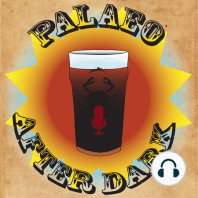107 min listen

Podcast 41 - Hallucigenia; Eating Planets and Crapping Rainbows
Podcast 41 - Hallucigenia; Eating Planets and Crapping Rainbows
ratings:
Length:
106 minutes
Released:
Sep 21, 2014
Format:
Podcast episode
Description
In this episode of Palaeo After Dark, the gang discusses the complicated history of Hallucigenia, and somehow gets completely derailed into rambling conversations about Star Trek 5, proper pronunciation, Gould’s “Wonderful Life”, microwave ovens, the effects of aging on your storytelling abilities, natural kinds versus individuals, puppy petting, poor puns, minions, food, Hell and Michael Bolton, LSD, oracles, stilt walkers, emus, otaku cat people, evolutionary convergence, My Little Pony, tripe, confusing a camera with a mouth, rubber bands, contingency, the importance of bricks, improper ways to train your cat/James, choking hazard candies, milk allergies, sharing, and historically important beers. Also, Amanda shares her reconstruction of Hallucigenia in its natural habitat (why it has a shapely pair of human legs, no one can say). If you want to get the point where we actually start talking about science, skip to 19:39 (it’s one of those podcasts).
References:
Ramsköld, Lars. "The second leg row of Hallucigenia discovered." Lethaia 25.2 (1992): 221-224.
Hou, Xianguang, and Jan Bergström. "Cambrian lobopodians–ancestors of extant onychophorans?." Zoological Journal of the Linnean Society 114.1 (1995): 3-19.
Gould, Stephen Jay. Wonderful life: the Burgess Shale and the nature of history. Random House, 2000.
Smith, Martin R., and Javier Ortega-Hernández. "Hallucigenia/'s onychophoran-like claws and the case for Tactopoda." Nature (2014).
References:
Ramsköld, Lars. "The second leg row of Hallucigenia discovered." Lethaia 25.2 (1992): 221-224.
Hou, Xianguang, and Jan Bergström. "Cambrian lobopodians–ancestors of extant onychophorans?." Zoological Journal of the Linnean Society 114.1 (1995): 3-19.
Gould, Stephen Jay. Wonderful life: the Burgess Shale and the nature of history. Random House, 2000.
Smith, Martin R., and Javier Ortega-Hernández. "Hallucigenia/'s onychophoran-like claws and the case for Tactopoda." Nature (2014).
Released:
Sep 21, 2014
Format:
Podcast episode
Titles in the series (100)
Podcast 0 - Taphonomy is a Process: Our pilot episode which originally was conceived as a companion piece to Palaeocast. Since this was our first run, we all apologize for the lack of pop filters. Otherwise, enjoy the discussion of taphonomy which begins with burying... by Palaeo After Dark